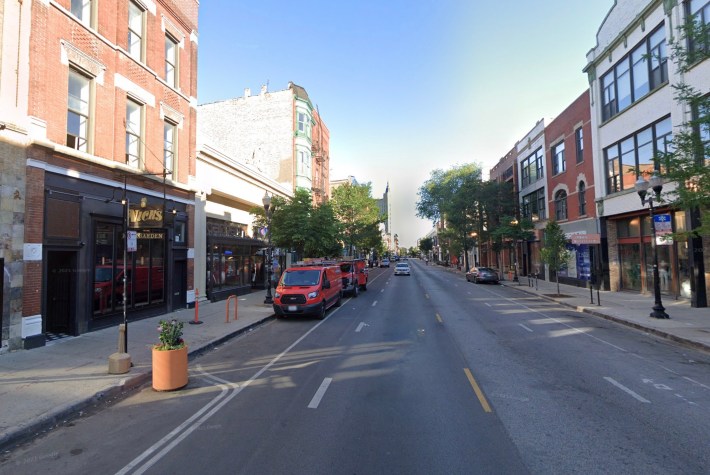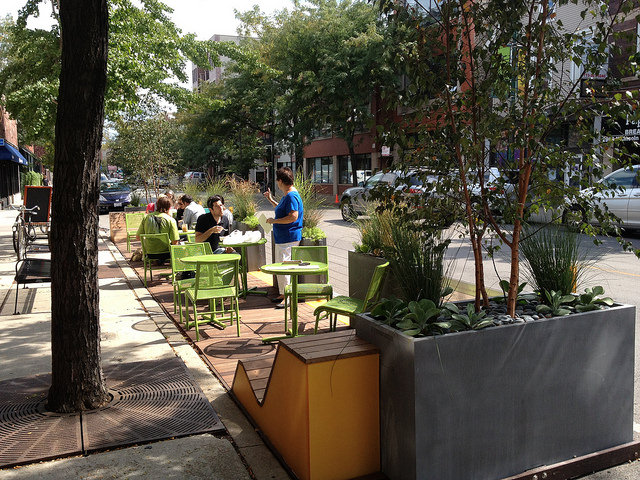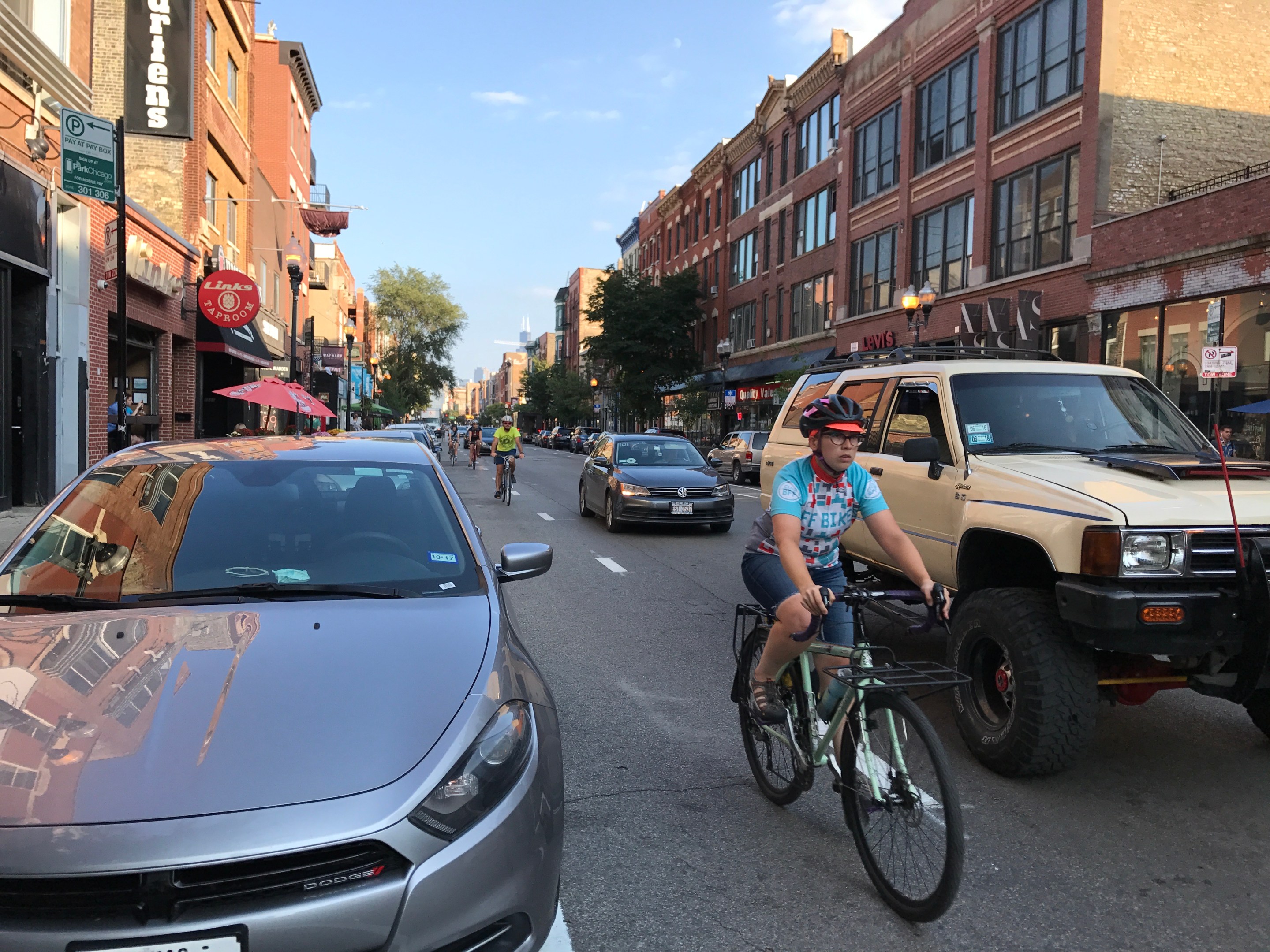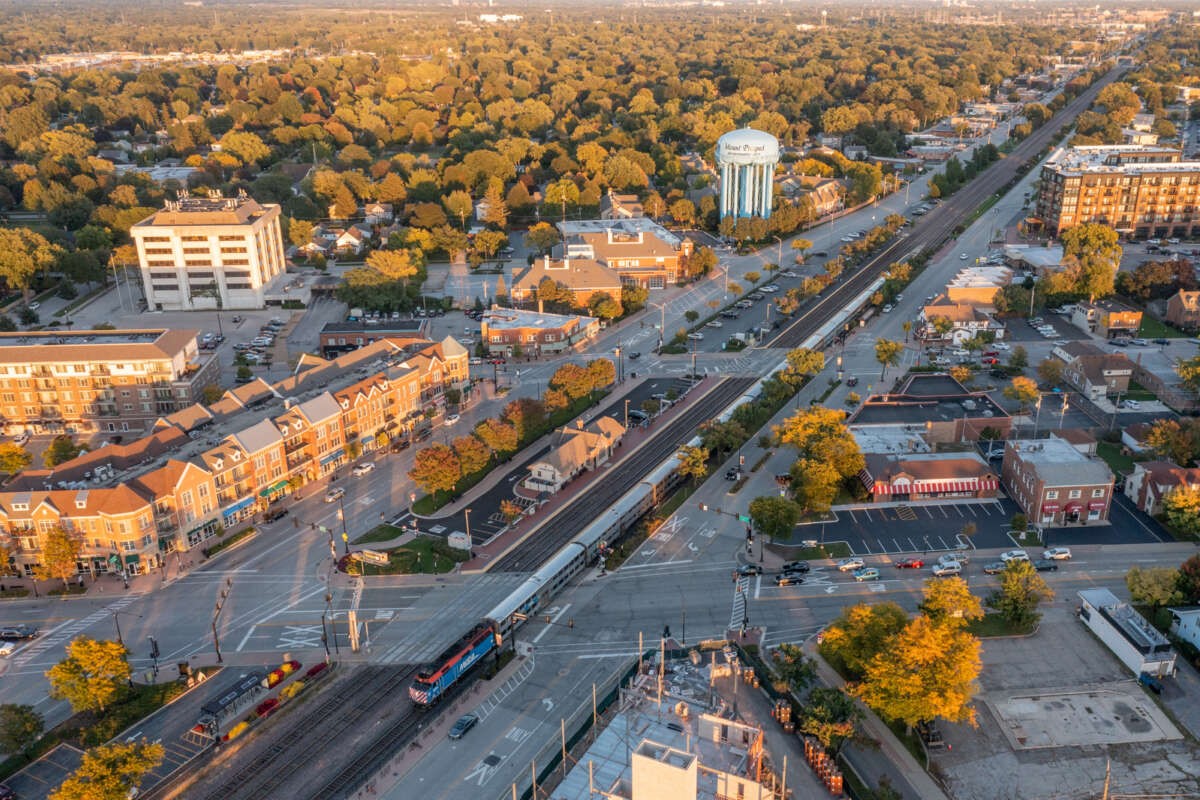Regardless of what you think of prohibiting late-night parking in entertainment districts as a strategy to discourage people from partying in their cars, if Chicago is going to do that, we should put the right-of-way to more productive uses as pedestrian, bike, and/or outdoor seating space.
As reported by Block Club Chicago's Quinn Myers, last week the City Council passed a permanent parking ban Thursday through Sunday from 10 p.m. to 5 a.m. on the 1400 and 1500 blocks of Milwaukee Avenue in Wicker Park, just southeast of the intersection of North, Damen, and Milwaukee avenues, in an effort to prevent illegal drinking and street crime. (Since metered parking is free after between 10 p.m. and 8 a.m., there's no need to compensate Chicago's parking concessionaire for lost revenue during these hours.)
Last year parking was prohibited on a temporary basis on Milwaukee between North and Division street after complaints from neighbors who blamed after-hours partying on the street for a spike in criminal activity. The new ordinance was sponsored by 1st Ward alderman Daniel LaSpata, who has been an advocate for sustainable transportation and traffic safety.
In summer 2021, owners of Milwaukee Avenue bars credited the parking ban with promoting a calmer atmosphere on the corridor, Block Club reported. However, no one was enforcing the ban on October 10, when a drive-by shooter killed one person and wounded four others near Milwaukee and Wood Street. Due to public safety concerns, 1st Ward residents recently voted in the district's participatory budgeting election to fund new lighting for the nearby Wood Street Blue Line viaduct. This month LaSpata said the ward has been coordinating with local police and the Chicago Department of Streets and Sanitation to do a better job of enforcing the parking prohibition through ticketing and towing.
Police say most of the rowdiness and crime has occurred on the 1400 and 1500 blocks, which is why the permanent ban is only being implemented on these blocks, according to Block Club.

Jeremy McDevitt, manager of Nick's Beer Garden at 1516 N. Milwaukee Ave., told the news website that the parking ban has been helpful for improving public safety, but he wishes that similar results could be achieved without the prohibition. “Not being able to pull up and park in front of businesses that customers want to go to is not an ideal scenario,” he said. “The street looks like a ghost town when all the cars are gone... If we can have it the way we wanted it, it would be to find a way to get the bad players out of that area, and also have the ability to have our customers drive to us.”
McDevitt's sentiments are understandable, and not only do empty parking lanes make the corridor look more desolate, they also encourage motorists to speed in the travel lanes, or even drive in the parking lanes, which is particularly dangerous for people cycling in the dashed bike lanes on Milwaukee.
One way to calm traffic on parking-free Milwaukee, make the strip look livelier, and help out bars and restaurants would be to allow them to use the empty parking lanes for extended outdoor seating. That has been an effective strategy for keeping Chicago hospitality businesses afloat during the COVID-19 pandemic. And surely having space for several more tables of customers is helpful to one's bottom line than a couple of car parking spots.

But let's look at the big picture. Rather than asking, "How will our customers be able to drive here?" (and we don't want people driving home from a night of drinking at a bar anyway), a better question for bar owners and other merchants to ask is, "How can we make it easier for customers to get here?" As it stands, the North/Damen/Milwaukee area is well-served by the adjacent Blue Line station and CTA bus lines on those three streets, as well as taxis and ride-hail. Creating safer, more comfortable conditions for walking and biking would make getting to Wicker Park without a car even easier and more appealing. Better transit access would also reduce car parking demand.
Why not run the No. 56 bus later into the night on weekends? It was a victim of the systemwide bus schedule cuts in 2009. Thirteen years later, the CTA has not improved the frequency of the 56 or made the stations along this Blue Line stretch accessible. https://t.co/vXAIYIk04u
— tracyswartz (@tracyswartz) February 1, 2022
The city regularly fences off parking lanes on Clark Street in Wrigleyville to create more pedestrian space during the neighborhood’s multiple bar crawls. It might make sense to do the same thing in Wicker Park when the parking bans are in place, which would also calm traffic and make the strip look more active.
Moreover, if it hasn't been that a major hardship to businesses for all parking to be banned on Milwaukee during some of the busiest nightlife periods, that indicates that it could also work for half of the car spaces to be stripped 24-7 to make room for physically protected bike lanes. While the parking meter contract would complicate things, similar approaches have already been taken on other stretches of Milwaukee and Clark Street:
And converting a parking lane of Milwaukee in Wicker Park to make space for protected lanes is not a new idea. In 2017, after an epidemic of dooring crashings, the Wicker Park Bucktown Chamber of Commerce Master Plan floated the idea of adding bike lanes. The Active Transportation Alliance helped organize support for the lanes, launching a petition calling for “new bikeways that eliminate risk of doorings and other common crashes,” and hosting a member meetup to discuss the proposal.

But some business and residents were opposed to converting a parking lane to make way for protected bike lanes. “It would kill the merchants,” Kevin O’Donnell, owner of the bar Pint at 1547 N. Milwaukee, told DNAinfo at the time. Local alderman Scott Waguespack (32nd) also expressed skepticism, and the Chicago Department of Transportation instead striped the dashed bike lanes, which I'd argue are better than nothing, but just barely.
But it sounds like removing all of the car parking on Milwaukee during prime bar-going hours hasn't actually been devastating to local businesses, but instead has been a minor inconvenience. That's evidence that converting only half of the spaces for protected lanes at all times wouldn't cause major problems either, but would instead make it safer and easier for customers to bike to their establishments. That would also reduce the amount of space for rowdy partying in cars, reassuring local residents, so it would be a win-win-win.



